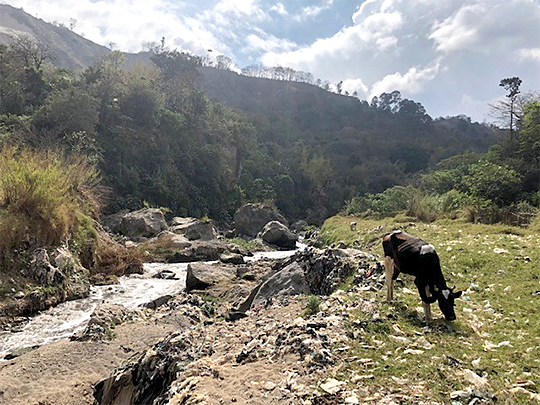This is my senior year at The University of Toledo, and I will graduate in May. Every year during our breaks, I have always worked as many hours as possible in order to save money for the next step of my life. However, it being senior year, I realized that I had never studied abroad and it saddened me to think that I might miss out on such an opportunity.
When I received an email in November stating the Jesup Scott Honors College was going on multiple service trips for spring break, I thought, “There’s my chance to see more of the world!” When I saw that one of my favorite, now retired, professors [Dr. Page Armstrong, former associate lecturer in the Honors College] was coming back to lead the trip to Guatemala, I was sold.
I’ve traveled to eight countries prior to going to Guatemala, but they were all tourist trips. I knew Guatemala would be different, that my purpose was to serve. I wasn’t expecting the large differences that greeted me.When nine students and I first got to Guatemala, it was dark. The airport was eerily empty, and everyone was tired from flying. Leaving the airport in our packed van, I tried to soak it all in. There was barbed wire on nearly every wall of the airport and other buildings. People everywhere were walking the streets. The homes seemed to be made out of metal materials all pieced together, and motorcycles weaved wildly in and out of traffic — culture shock.
The retreat we arrived at was beautiful with its center courtyard and artistic paintings and sculptures scattered throughout. It was a building I came to truly appreciate over the course of the week as I “recovered” from the hard days’ work.
On our first day, we visited the area of Atitlán, which included a gorgeous view of Lake Atitlán, a calming boat ride, and lunch with a breathtaking view. The three-hour drive to Atitlán provided me with plenty of time to take in more sights with daylight; to say I was overwhelmed is an understatement. So many people were out walking on dirty, trash-covered streets; dogs belonging to no one ran to and from people begging for food; children followed parents or were held to their mothers by cloth wrapped around shoulders; and women carried bundles of their trinkets for sale on their heads. Dust kicked up as we drove through different villages. Roadside markets popped up every now and then, and I watched as people unloaded their products and set up their displays. I had no idea what to expect for our first day of service, so I made sure to take in everything during our trip to Atitlán.

This photo shows the river Brianna Becraft saw each time she pushed the wheelbarrow to move dirt while helping to renovate a tutoring center in Chinautla.
I spent a lot of time loading up wheelbarrows of dirt and gravel and moving it from its original pile to the tutoring center, which we were working to improve. I was tired early on and contemplated whether I could make it another four days. After lunch the first day, I started to take comfort in the view of the river every time I rounded the corner with yet another load of dirt. I began having conversations with the students from my trip, and I became more confident in my ability to stick it out.
I also learned how to bend iron and tie metal to rebar in a way that created structures to solidify the tutoring center’s foundation once cement was able to be poured. My fingers hurt from pushing wires together, and my arms were burnt because I had forgotten to apply sunscreen that first day, yet I was so happy to be of service, to learn about an area of the world that I had never thought about, and to see how the people of Guatemala truly appreciated what little they had.I learned a lot from the service in the village, but I also learned a lot from our nightly group discussions. Each night, we were presented with questions to journal about from blame and solutions, to listening and learning who we tell ourselves we are. I was able to hear different views from my peers and even continue group discussion with a few close friends each night, until we felt like we had solved some of the world’s greatest problems (although I can assure you, we did not). My journal is filled with answers to group discussion questions, self-reflections, and poems about the things I saw, heard and learned. It felt great to serve, get to know my peers, learn about myself, and be away from technology for a while.
Everyone should consider taking some form of service trip because it’s a totally immersive and creative way of learning about things that a classroom just isn’t able to provide. I can’t express how grateful I am for everything that I have here at home, and I’m also interested in continuing service work in some way as I move onto the next chapter of my life, post-graduation next month. I made lifelong friends and self-realizations that I would not have made had I stayed home for break another year and worked.
Becraft is a senior majoring in paralegal studies in the College of Health and Human Services; she also is a student in the Jesup Scott Honors College. She will graduate in May.